高中英语直接引语和间接引语讲解
高中英语直接引语和间接引语讲解
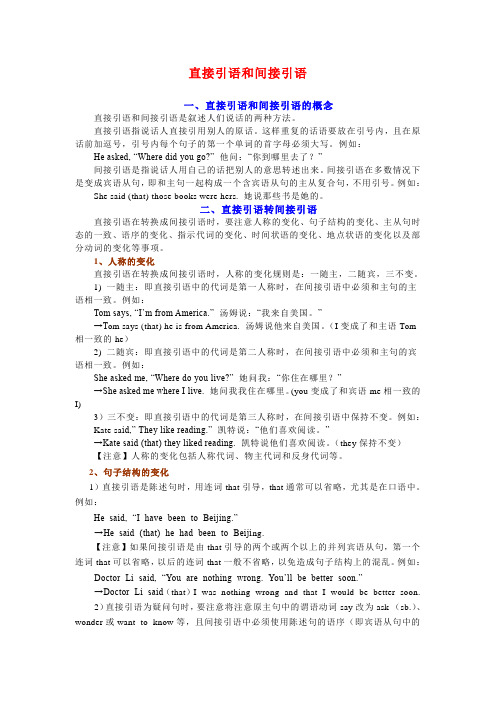
直接引语和间接引语一、直接引语和间接引语的概念直接引语和间接引语是叙述人们说话的两种方法。
直接引语指说话人直接引用别人的原话。
这样重复的话语要放在引号内,且在原话前加逗号,引号内每个句子的第一个单词的首字母必须大写。
例如:He asked, “Where did you go?” 他问:“你到哪里去了?”间接引语是指说话人用自己的话把别人的意思转述出来。
间接引语在多数情况下是变成宾语从句,即和主句一起构成一个含宾语从句的主从复合句,不用引号。
例如:She said (that) those books were hers. 她说那些书是她的。
二、直接引语转间接引语直接引语在转换成间接引语时,要注意人称的变化、句子结构的变化、主从句时态的一致、语序的变化、指示代词的变化、时间状语的变化、地点状语的变化以及部分动词的变化等事项。
1、人称的变化直接引语在转换成间接引语时,人称的变化规则是:一随主,二随宾,三不变。
1) 一随主:即直接引语中的代词是第一人称时,在间接引语中必须和主句的主语相一致。
例如:Tom says, “I’m from America.” 汤姆说:“我来自美国。
”→T om says (that) he is from America. 汤姆说他来自美国。
(I变成了和主语Tom 相一致的he)2) 二随宾:即直接引语中的代词是第二人称时,在间接引语中必须和主句的宾语相一致。
例如:She asked me, “Where do you live?” 她问我:“你住在哪里?”→She asked me where I live. 她问我我住在哪里。
(you变成了和宾语me相一致的I)3)三不变:即直接引语中的代词是第三人称时,在间接引语中保持不变。
例如:Kate sa id,” They like reading.” 凯特说:“他们喜欢阅读。
”→Kate said (that) they liked reading. 凯特说他们喜欢阅读。
英语中的直接引语和间接引语

英语中的直接引语和间接引语一、直接引语和间接引语的概念1. 直接引语- 直接引语就是直接引用别人的原话,被引用的部分通常放在引号内。
例如:He said, "I am going to the park." 在这个句子中,“I am going to the park.”就是直接引语,它原封不动地呈现了说话者所说的内容。
2. 间接引语- 间接引语是用自己的话转述别人的话,不用引号。
例如:He said that he was going to the park. 这里“he was going to the park”就是间接引语,它是对原句“He said, 'I am going to the park.'”的转述。
二、直接引语变间接引语的变化规则1. 人称的变化- 如果直接引语中的主语是第一人称(I或we),在变为间接引语时,要根据句子的意思相应地变为第三人称(he/she或they)。
- 例如:- 直接引语:I said, "I like this book."- 间接引语:I said that I liked this book.(这里因为主语都是I,人称不变,但如果是He said, "I like this book." 变为间接引语就是He said that he liked this book.)- 如果直接引语中的第二人称(you),在变为间接引语时,要根据转述者和听话者的关系变为第一人称(I/we)或第三人称(he/she/they)。
- 例如:- 直接引语:He said to me, "You are a good student."- 间接引语:He told me that I was a good student.- 直接引语:He said to her, "You should study hard."- 间接引语:He told her that she should study hard.2. 时态的变化- 一般现在时变为一般过去时。
高中英语-直接引语和间接引语

一、直接引语直接引用别人的原话叫做直接引语,直接引语通常置于引号内(“引用原话”)。
—“What is it all about?”—“究竟是什么事呢?”—“Nothing serious, just a storm in a teacup.”—“没有什么,大惊小怪而已。
”二、间接引语用自己的话转述别人的意思,或引用自己说过的话,都叫做间接引语。
间接引语多数用宾语从句来表达。
Mary said that she received a sugar report this morning.玛莉说她今天早上收到了一封情书。
He said that his hands were quite full at that moment.他说那时他忙得不可开交。
三、直接引语与间接引语的转换在将直接引语转换为间接引语时,不仅句式上要有变化,而且要在时态、人称、时间、地点等方面作相应的变化。
1、引语转换时的句式变化不同的直接引语句式,如:陈述句、疑问句、祈使句和感叹句,转换成间接引语时要遵循一定的句式转换规则,还要注意根据句意,使用适当的引述动词。
(1)陈述句的间接引语将陈述句转换为间接引语,通常用that引导的宾语从句来表达。
连词that 在不引起歧义的情况下可以省略。
引述分句的动词常见的有say 和tell等。
He said, “I caught a cold yesterday.”他说:“我昨天感冒了。
”He said (that) he had caught a cold the day before.他说他前天感冒了。
Helen said to me, “I’m tired of taking such exams.”海伦说:“我讨厌参加这种考试。
”Helen told me (that) she was tired of taking such exams.海伦说她讨厌参加这种考试。
在下列情况下,往往要保留that。
高中英语直接引语和间接引语课件新人教版.ppt

Pair work
• One of you will be a child and the other the grandmother. The grandmother is listening to a weather report with her grandchild. Try to use indirect speech in your dialogue.
the day before
the night before then
before
that day
the next day
in two days’ time
指示代词 this
that
these
those
Please change the
sentences from direct
speech into indirect speech
He asked me if I wanted to go by train or by plane. ⒎ He said to me, “I will see her next week.” →
He told me that he would see her the next week. ⒏ He said, “Where there is a will, there is a way.”
疑问句的语序 人称
第一人称 第二人称
第三人称
第三人称
第一人称或第三 人称 第三人称
时态
一般现在时 一般过去时
一般将来时 现在进行时 现在完成时 过去完成时
一般过去时 过去完成时
高中英语知识点归纳直接引语和间接引语的转换和应用

高中英语知识点归纳直接引语和间接引语的转换和应用在高中英语学习中,直接引语和间接引语是重要的语法知识点。
了解它们的转换和应用方法,可以帮助学生更好地理解和运用英语。
本文将对直接引语和间接引语的转换和应用进行归纳和总结。
直接引语是原原本本地引述别人的话,使用引号将其包围起来,并使用适当的标点符号。
在转化为间接引语时,需要进行人称、时态、指示词等方面的调整。
第一部分:直接引语的转换和应用直接引语是包含他人原话的直接陈述,使用引号将其引用出来。
下面是一些关于转换直接引语的基本规则:1. 当主句的时态是一般现在时时,直接引语的时态不做改变。
例如:直接引语:She said, "I am a student."间接引语:She said that she is a student.2. 当主句的时态是一般过去时时,直接引语的时态要向过去时转换。
例如:直接引语:She said, "I will go to the cinema."间接引语:She said that she would go to the cinema.3. 当直接引语是被引述者的陈述句时,可以使用that来引导间接引语。
例如:直接引语:He said, "I am happy."间接引语:He said that he was happy.第二部分:间接引语的转换和应用间接引语是将直接引语转换为自己的话,不使用引号,而是通过动词引导和适当的调整来传达别人的话。
以下是一些关于应用间接引语的基本规则:1. 当直接引语中有一些特定的指示词(如now、here、this、these),在转换成间接引语时要进行相应的改变。
例如:直接引语:She said, "I am going now."间接引语:She said that she was going then.2. 当引述者自己有一些表示过去的指示词时,要根据语境进行适当调整。
高一英语直接引语与间接引语知识精讲PPT课件.ppt

时态、时间状语、地点状语、指示代词、动词、呼 语等方面的变化。 ❖ 1. 人称的变化,包括人称代词、物主代词、反身代 词等。
❖ He said , “ I’ve left my book in your room . ” ❖ 他说:“我把我的书落在了你的房间。”
❖ (1)They said , “ we are having an exam now . ” 他们说, “我们正在考试。”
❖ They said that they were having an exam then . 他们说 那时他们正在考试。
❖ (2)John told me , “ About 5,000 people went to the concert yesterday . ”
❖ ▲ 没有间接宾语的,可以加一个间接宾语。 如me,him等。
❖▲ 从句用陈述语序。 ❖eg .(1)He said , “ Do you
understand ? ” ❖他问,“你理解吗?”
❖ He asked me if / whether I understood .
❖他问我是否我理解了。
❖ (2)He asked me , “ Which part of China impresses you most ? ”
❖ (3)tonight→that night (4)this week→that week
❖ (5)yesterday→the day before (6)yesterday evening→the evening before
❖ (7)last week→the week before (8)three days ago→three days before
高中英语知识点归纳直接引语和间接引语的变化规则
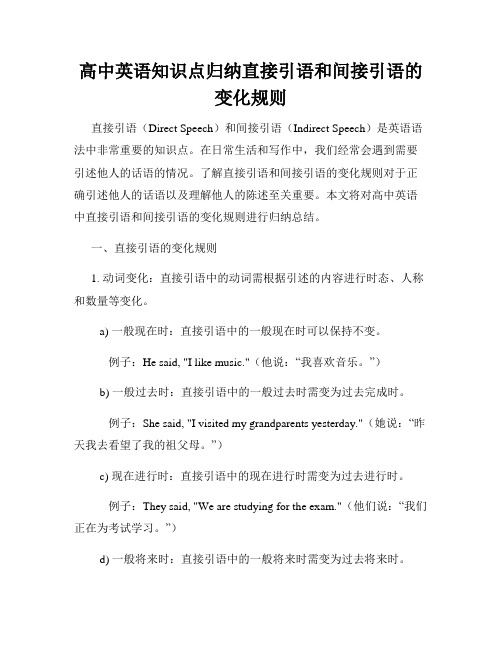
高中英语知识点归纳直接引语和间接引语的变化规则直接引语(Direct Speech)和间接引语(Indirect Speech)是英语语法中非常重要的知识点。
在日常生活和写作中,我们经常会遇到需要引述他人的话语的情况。
了解直接引语和间接引语的变化规则对于正确引述他人的话语以及理解他人的陈述至关重要。
本文将对高中英语中直接引语和间接引语的变化规则进行归纳总结。
一、直接引语的变化规则1. 动词变化:直接引语中的动词需根据引述的内容进行时态、人称和数量等变化。
a) 一般现在时:直接引语中的一般现在时可以保持不变。
例子:He said, "I like music."(他说:“我喜欢音乐。
”)b) 一般过去时:直接引语中的一般过去时需变为过去完成时。
例子:She said, "I visited my grandparents yesterday."(她说:“昨天我去看望了我的祖父母。
”)c) 现在进行时:直接引语中的现在进行时需变为过去进行时。
例子:They said, "We are studying for the exam."(他们说:“我们正在为考试学习。
”)d) 一般将来时:直接引语中的一般将来时需变为过去将来时。
例子:He said, "I will go to the cinema tomorrow."(他说:“明天我将去电影院。
”)2. 代词变化:直接引语中的人称代词(例如I、you、he、she、they 等)需按照引述者的身份进行变化。
例子:He said, "I am going to the park."(他说:“我要去公园。
”)3. 时间和地点变化:直接引语中的时间和地点词语需根据实际情境进行变化。
例子:She said, "I will meet you at the library tomorrow."(她说:“明天我会在图书馆见你。
高中英语必修四:M4U1直接引语间接引语课件 (共14张PPT)

间接引语
一般过去时 过去进行时 过去完成时 过去完成时 过去将来时
由直接引语转变为间接引语,下列情况 时态不变:
1. 客观不变的真理
The teacher said to the students, “Water freezes when the temperature falls below 0℃.” → The teacher told the students that water __fr_e_e_z_e_s_ when the temperature ___f_a_ll_s___ below 0℃.
•7、is a progressive discovery of our ignorance.教育是一个逐步发现自己无知的过程。2021/11/272021/11/27November 27, 2021
•8、is a admirable thing, but it is well to remember from time to time that nothing worth knowing can be taught.教育 是令人羡慕的东西,但是要不时地记住:凡是值得知道的,没有一个是能够教会的。2021/11/272021/11/272021/11/272021/11/27
She asked me if __I____ was interested in science.
3. His mother said to me, “ He can’t go to school.”
His mother told me that __h_e____ couldn’t go to school.
6、does not mean teaching people to kow what they do not know ; it means teachng them to behave as they do not behave. 教育不在于使人知其所未知,而在于按其所未行而行。2021年11月2021/11/272021/11/272021/11/2711/27/2021
高中英语语法-直接引语和间接引语

类别1:直接引语为祈使句
当祈使句是肯定句时, 使用 ask/tell sb. to do sth.
当祈使句是否定句时, 使用 ask/tell sb. not to do sth .
eg. 把下列直接引语改为间接引语
❖He said to me, “open the window, please.”
here
there
类别3:直接引语为特殊疑问句
1、引导词为 疑问词 . 2、疑问语序要改成 陈述句语序 . (疑问词 + 主语 + 谓语 + 其他成分)
3、人称的改变(一随主、二随宾、三不变)
4、时态的变化 (主句用现在时或将来时,从句可用任何时态。 主句用过去时,从句用与过去相关的时态。)
Now, let’s check :
He said, “I came to help you.”
She said, “I’ll do it after class.”
He said that he had come to help me. She said that she would do it after class.
He said, “I had finished He said that he had finished the my homework before supper.” homework before supper.
直接引语与间接引语
(Direct Speech and Indirect Speech)
直接引语 (direct speech)
:
直接引述别人的原话,把 它放在引号内
间接引语 (indirect speech):用自己的话转述别人的话
新人教版高中英语必修一直接引语和间接引语 ppt课件

3.直接引语是特殊疑问句 不加间接宾语me也可
变为间接引语时,连接词用特殊疑问句的疑问词,疑问
语序变为陈述语序. 句型: S--V—疑问词从句. The teacher said, “What are you doing now?” 无间接宾语
→2T02h0/1e2/2t7eacher asked me what I was doing then.
7
加间接宾语 me
➢时间变化
直接引语
间接引语
now
then
today
that day
tonight
that night
this week/month/year/
that week/month/year/
morning/afternoon/evening morning/afternoon/evening
3
➢时态变化 直接引语
一般现在时 一般将来时 现在进行时 一般过去时 现在完成时 过去完成时
间接引语 一般过去时 过去将来时 过去进行时 过去完成时 过去完成时 过去完成时
现在将来变过去, 过去变过去完成, 过去完成不变.
2020/12/27
4
➢人称变化
使间接引语中的人称与直接引语中的人称指向一致.
宾 语的人称保持一致 up early.”
early.
三 引号内的第三人称 She said to me , She told me that
不 在变间引后人称不 “ They want to they wanted to
变 变 2020/12/27
help him.” help him. 5
二随宾
2
➢ 若直接引语中没有间接宾语,变为间接引语时可加一 个间接宾语,如 me,him,her,theu,you,us 等.但用told间接引语 主句的谓语动词时必修加间接宾语,句型: S told sb. 从句.
高中英语 U1语法直接引语和间接引语课件 新人教必修1

“What do you think of the film?” She asked her friend.
She asked her friend
which room
I
lived in
what
she
thought of
the film
.பைடு நூலகம்
.
3.直接引语是选择疑问句,变间接引语时, 引导词: whether/if …or 语序:陈述句语序 句尾标点:随主句标点
4. Where are you going for vacation, Tony? I asked Tony 5. Do you remember his birthday? She asked 6. “What can I do for you?” he asked me. He asked me 7. “Are you interested in English?” he said. He asked
He told us,“I want this blue one.”
He told us ____________________________.
She said to me, “You can’t do anything now.”
She told me ____________________________.
I was/am
his
was
1. Mary asked, “Could you help me cook dinner?” Mary asked me 2. He asked, “Why are you so late for school, Jimmy?” He asked Jimmy 3. Will you tell me the answer to this question? She asked
高中英语知识点归纳直接引语和间接引语的特殊情况
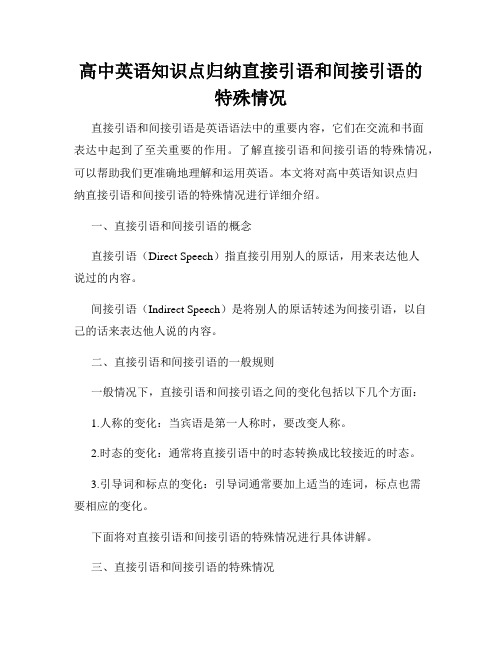
高中英语知识点归纳直接引语和间接引语的特殊情况直接引语和间接引语是英语语法中的重要内容,它们在交流和书面表达中起到了至关重要的作用。
了解直接引语和间接引语的特殊情况,可以帮助我们更准确地理解和运用英语。
本文将对高中英语知识点归纳直接引语和间接引语的特殊情况进行详细介绍。
一、直接引语和间接引语的概念直接引语(Direct Speech)指直接引用别人的原话,用来表达他人说过的内容。
间接引语(Indirect Speech)是将别人的原话转述为间接引语,以自己的话来表达他人说的内容。
二、直接引语和间接引语的一般规则一般情况下,直接引语和间接引语之间的变化包括以下几个方面:1.人称的变化:当宾语是第一人称时,要改变人称。
2.时态的变化:通常将直接引语中的时态转换成比较接近的时态。
3.引导词和标点的变化:引导词通常要加上适当的连词,标点也需要相应的变化。
下面将对直接引语和间接引语的特殊情况进行具体讲解。
三、直接引语和间接引语的特殊情况1.特殊疑问句的引述当直接引语是特殊疑问句时,间接引语要使用“asked”或者“wondered”等动词引导,同时要将疑问句改为陈述句。
例子:Direct Speech (直接引语): "Where are you going?" he asked.Indirect Speech (间接引语): He asked where I was going.2.陈述句的特殊情况当直接引语是陈述句且为真理、客观事实或总结性陈述时,间接引语不需要改变时态、人称和时间等。
例子:Direct Speech (直接引语): "Water boils at 100 degrees Celsius."Indirect Speech (间接引语): He said that water boils at 100 degrees Celsius.3.祈使句的引述当直接引语是祈使句时,间接引语中要使用“tell”或者“ask”等动词引导,同时要注意将时态、人称和标点做相应的调整。
(完整)高中英语直接引语与间接引语讲义
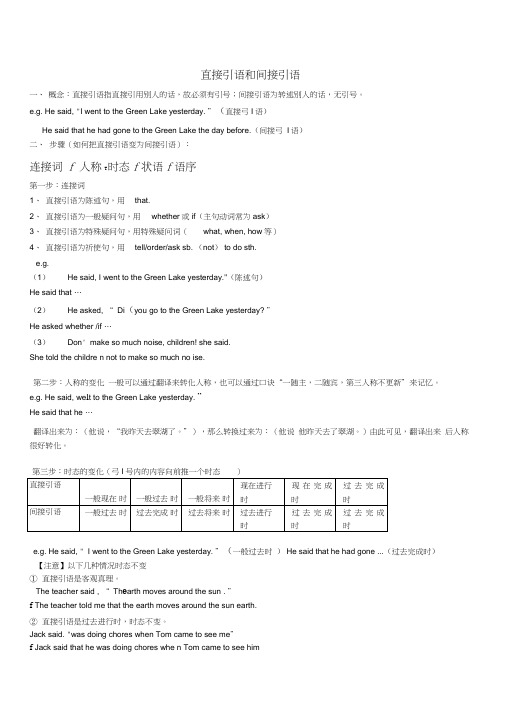
直接引语和间接引语一、概念:直接引语指直接引用别人的话,故必须有引号;间接引语为转述别人的话,无引号。
e.g. He said, "I went to the Green Lake yesterday. ”(直接弓I语)He said that he had gone to the Green Lake the day before.(间接弓I语)二、步骤(如何把直接引语变为间接引语):连接词f人称T时态f状语f语序第一步:连接词1、直接引语为陈述句,用that.2、直接引语为一般疑问句,用whether或if(主句动词常为ask)3、直接引语为特殊疑问句,用特殊疑问词(what, when, how等)4、直接引语为祈使句,用tell/order/ask sb. (not) to do sth.e.g.(1)He said, I went to the Green Lake yesterday."(陈述句)He said that …(2)He asked, “ Di(you go to the Green Lake yesterday? ”He asked whether /if …(3)Don' make so much noise, children! she said.She told the childre n not to make so much no ise.第二步:人称的变化一般可以通过翻译来转化人称,也可以通过口诀“一随主,二随宾,第三人称不更新”来记忆。
e.g. He said, we l t to the Green Lake yesterday. ”He said that he …翻译出来为:(他说,“我昨天去翠湖了。
”),那么转换过来为:(他说他昨天去了翠湖。
)由此可见,翻译出来后人称很好转化。
第三步:时态的变化(弓I号内的内容向前推一个时态)e.g. He said, " I went to the Green Lake yesterday. ”(一般过去时) He said that he had gone ...(过去完成时)【注意】以下几种情况时态不变①直接引语是客观真理。
高中英语直接引语和间接引语用法讲解

高中英语直接引语和间接引语用法讲解一、概述引用或转述别人说的话时有两种方法:直接引述别人的原话,这叫做直接引语(direct speech)。
用自己的话转述别人的话,叫间接引语(indirect speech)。
一般地讲,直接引语前后要加引号,间接引语不用引号,而用宾语从句来表达。
Mr. Black said, “I'm busy.”布菜克先生说:“我很忙”。
(直接引语)Mr. Black said that he was busy.布菜克先生说他很忙。
(宾语从句是间接引语)从上例看来,直接引语改为间接引语时,除将直接引语改为宾语从句之外,还须对直接引语中的人称和时态进行相应的变化,如上例直接引语中的I 改成了he, am 则改成了was 。
现将由直接引语改为间接引语时应注意的问题,分述如下:二、直接引语是陈述句时直接引语如果是陈述句,变为间接引语时,用连词that 引导(that 在口语中常省去),that 从句之前用say 、tell 等动词,从句中的人称、时态、指示代词、时间状语、地点状语等要作相应的变化。
1、 人称的变化直接引语改为间接引语人称要相应的变化,把直接引语中的第一人称(如:I ,me ,my ,mine ,we ,us ,our ,ours)变为与主句的主语相一致的人称。
把直接引语中的第二人称(you ,your ,yours)变为和主句的间接宾语(即听话人,如无听话人,可根据上下文的体会人为确定一个人称)相一致的人称。
直接引语中的第三人称(he ,him ,his ,she ,her ,hers,it ,its,they,their ,theirs ,them)变为间接引语时,人称不变。
He said , “I like it very much.” 他说:“我非常喜欢它”。
→He said that he liked it very much. 他说他非常喜欢它。
高中英语 直接引语和间接引语PPT

4. He asked me ________ with me. A. what the matter is B. what the mater was C. what’s the matter D. what was the matter 5. He said, “Don’t do that again.” He _____ me _______ that again. A. said to me; not to do B. said to me; don’t do C. told me; don’t do D. told me; not to do
9. John asked me _______ to visit his uncle’s farm with him.
A. how would I like
B. if or not would I like
C. whether I would like
D. which I would like
(2)直接引语变间接引语时, 指示代词、时 间状语、地点状语等要作相应的变化。如: this/that→ these/those, now→ then, today→ that day, yesterday→ the day before, last year→ the year before, ago→ before, here→ there等。 He said, "I haven't seen her today."→ He said that he hadn't seen her that day.
2. He asked , “ Are you a Party member or a League member?” →He asked me _________. A. am I a Party member or a League member B. was I a Party member or a League member C. if I was a Party member or a League member D. whether was I a Party member or a League member.
高中英语,直接引语和间接引语的用法-最全
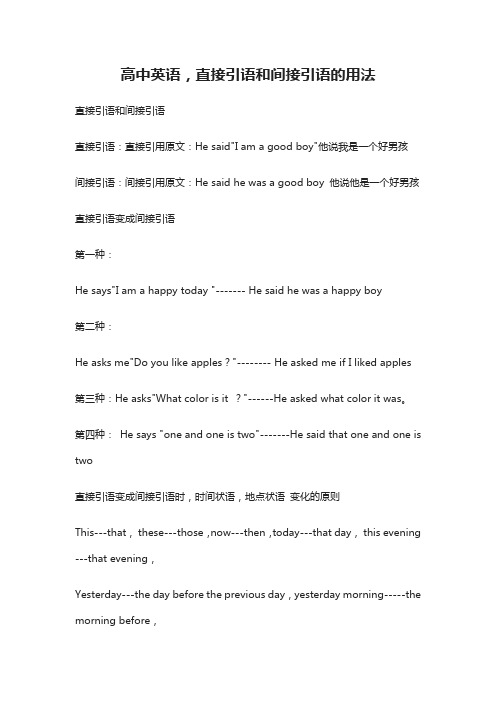
高中英语,直接引语和间接引语的用法直接引语和间接引语直接引语:直接引用原文:He said"I am a good boy"他说我是一个好男孩间接引语:间接引用原文:He said he was a good boy 他说他是一个好男孩直接引语变成间接引语第一种:He says"I am a happy today "------- He said he was a happy boy第二种:He asks me"Do you like apples?"-------- He asked me if I liked apples 第三种:He asks"What color is it ?"------He asked what color it was。
第四种:He says "one and one is two"-------He said that one and one is two直接引语变成间接引语时,时间状语,地点状语变化的原则This---that,these---those,now---then,today---that day,this evening ---that evening,Yesterday---the day before the previous day,yesterday morning-----the morning before,Last night---the night before,two days ago------two days before,next week----the next week,the following day,tomorrow---the next day ,the following day,the day after tomorrow-----in two days' time,here---there,bring---take,come---go,时态的变化:1,He said "he likes apples"----He said he liked apples2,He said "he is reading ,now"----He said he was reading ,then 3,He said "he has read the book"---He said he had read the book 4,He said "he had read the book"----He said he had read the book 5,He said "he had been reading books two hours "---He said he had been reading books two hours6,He said "he was reading books "----He said he was reading books 7,He said "he read books,yesterday "----He said that he had read books ,the day before8,He says"He will read books"----He said that he would read books9,He said "he has been reading books two hours"----He said that he had been reading books two hours直接引语变成间接引语的时态无须改变1,引述动词为一般现在时He says "I will go to school,tomorrow"---He says she will go to school tomorrow2,引述动词为将来时He will say"I will try my best"----He will say that he will try his best3,直接引语带有具体的过去时间The boy said"he was born in 1990"-----The boy said he was born in 1990 4,客官事实和真理时He said"one and one is two"----He said that one and one is two5,直接引语时谚语的时候He said"Never too old to learn"---He said that never too old to learn 6,直接引语中有情态动词He said "he could read books "---He said he could read books7,以when he while 引导的过去时间的从句He said "When I was a child ,I could read English books"----He said when he was a child ,he could read English books句式的变化:1,陈述句时,遇到say,tell,explain 等词汇时,用that连接使用He said to me "You should study hard"---He told that I should study hard2,在一般疑问句或者反义疑问句时,通常用if,whether 连接He asked me"Do you like apples?"He asked me if I liked applesHe asked me "Do you like apples,don't you?"He asked me if I liked apples在选择疑问句时,通常用whether 。
(完整)高中英语直接引语和间接引语讲解
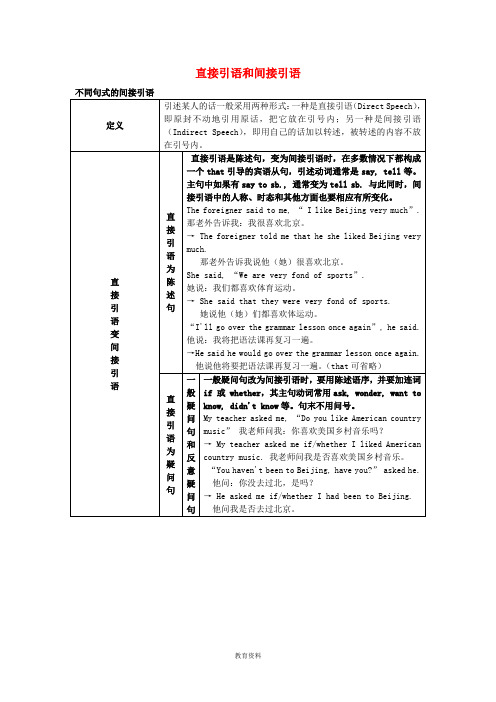
He said, “Every dog has his day”.
→ He said that every dog has his day. 他说是人皆有出头日。
c. 间接引语中动词表示的动作说话时仍在进行或状态仍然存在,时态可保
持不变。
He said,“The window is broken”.
直
接
引
语
为
祈
使
句
1.直接引语为祈使句时,间接引语往往用复合宾来表示,其结构为主语+谓语+宾语+宾语补足语(动词不定式)。引述动词可根据口气选用tell, ask, order, command, request等词,句中please去掉。
She said to me,“Please have a res”t.
她说:我们都喜欢体育运动。
→ She said that they were very fond of sports.
她说他(她)们都喜欢体运动。
“I'll go over the grammar lesson once again”, he said.
他说:我将把语法课再复习一遍。
→He said he would go over the grammar lesson once again.
He says, I have accepted her invitation.
He says he has accepted her invitation. 他说他已接受了她的邀请。
比较:
间接引语中的谓语动词时态对比。
Sarah said to me,I have two brothers. 莎莎对我说:“我有两个弟弟。”
高中英语语法直接引语和间接引语

直接引语和间接引语作者:叶文斌二、直接引语变间接引语的时态规律五、不同类型的直接引语变为间接引语的规律Grammar Work[语法专练]1.将下面的直接引语改为间接引语a. Aunt Emily said to me, “I will take your daughter to the history museum tomorrow.”____________________________________________________________________________ b. Tom asked, “Do you have the habit of having sports every day?”____________________________________________________________________________ c. My sister asked me, “When did you find the answer to this question?”____________________________________________________________________________ d. “My workers are trying to finish this task ahead of time,” the engineer said to us.____________________________________________________________________________ e. Mr. Smith said to us, “Don’t be late for school tomorrow, please.”____________________________________________________________________________ 2.将下面的间接引语改为直接引语a. The teacher asked us who could solve that difficult question.____________________________________________________________________________ b. The traveler said that everything had changed since he came last time.____________________________________________________________________________ c. The old man order his grandsons to be quiet.____________________________________________________________________________ d. He said that his parents should have been there three days before, but they were not there then. ____________________________________________________________________________ e. The interviewee asked me when I was born.____________________________________________________________________________Grammar Quiz[语法小测]1. Little brother asked me _____ I could buy him a toy when I went to town.A. whetherB. /C. thatD. how2. —Could you tell me where I can find the bus stop?—Yes, I will tell you _____ you want to know.A. thatB. ifC. whatD. which3. —_____?—No, she left here without one word.A. Did Julia say when she will come backB. Did Julia when will she come backC. Did Julia say when she would come backD. Did Julia say when would she come back4. Can you tell me _____ the post office in a short way, sir?A. how can I get toB. how I can get toC. where can I get toD. where I can get to5. The repairman asked Mr. Black _____ with his air conditioner.A. what the matter isB. what the matter wasC. what is the matterD. what was the matter6. Mr. Bush told his listener that Edison _____ the electric light last century.A. inventsB. inventedC. has inventedD. had invented7. Mother _____ if I could open the tight window _____.A. said to me; thereB. asked me; thereC. asked to me; hereD. said to me; here8. The lawyer asked inspectors _____ evidence found here was true or not.A. thatB. whichC. ifD. whether9. I ask my boss if he _____ to my birthday party when he _____ time next Sunday.A. comes; will haveB. comes; hasC. will come; will haveD. will come; has10. Do you remember how many times _____ to Shanghai since last year?A. you have beenB. have you beenC. had you beenD. did you goGrammar Work[语法专练]1.将下面的直接引语改为间接引语a. Aunt Emily said to me that she would take my daughter to the history museum the next day.b. Tom asked us whether we had the habit of having sports every day.c. My sister asked me when we had found the answer to this question.d. The engineer told us that his workers are trying to finish that task ahead of time.e. Mr. Smith told us not to be late for school the following day.2.将下面的间接引语改为直接引语a. The teacher said to us, “who can solve this difficult question?”b. The traveler said, “Everything has changed since he came last time”.c. “Be quiet, please,” said the old man.d. He said, “My parents should have been here three days ago, but they are not here now.”e. The interviewee said, “”When were you born?”Grammar Quiz[语法小测]1-5 ACCBD 6-10 BBDDA。
- 1、下载文档前请自行甄别文档内容的完整性,平台不提供额外的编辑、内容补充、找答案等附加服务。
- 2、"仅部分预览"的文档,不可在线预览部分如存在完整性等问题,可反馈申请退款(可完整预览的文档不适用该条件!)。
- 3、如文档侵犯您的权益,请联系客服反馈,我们会尽快为您处理(人工客服工作时间:9:00-18:30)。
定义
引述某人的话一般采用两种形式:一种是直接引语(Direct Speech),即原封不动地引用原话,把它放在引号内;另一种是间接引语(Indirect Speech),即用自己的话加以转述,被转述的内容不放在引号内。
直
接
引
语
变
间
接
引
语
直接引语为陈述句
直接引语是陈述句,变为间接引语时,在多数情况下都构成一个that引导的宾语从句,引述动词通常是say, tell等。主句中如果有say to sb.,通常变为tell sb.与此同时,间接引语中的人称、时态和其他方面也要相应有所变化。
她说:我们都喜欢体育运动。
→She said that they were very fond of sports.
她说他(她)们都喜欢体运动。
“I'll go over the grammar lesson once again”, he said.
他说:我将把语法课再复习一遍。
→He said he would go over the grammar lesson once again.
詹姆士问:你为什么不徒步旅行?
James advised me to go hiking.詹姆士建议我去徒步旅行。
③. offer to do
He said,“Would you like me to post the letter?”
他说:你要我寄信吗?
He offered to post the letter.他主动提出寄信。
He asked,“How do you like it?”.他问:你觉得怎样?
→He asked me how I liked it.他问我觉得它怎样。
She asked me,“What's the matter with you?”
她问我:你怎么啦?
→She asked me what was the matter with me.
④.ask sb to do
“Will you please bring your reference book here tomorrow?”, she said to me.
她对我说:劳驾你明天把你的参考书带来好吗?
→She asked me to take my reference book there the next day.她让我第二天把我的参考书带去。
她对我说:请休息一下。
→She asked me to have a rest.
她要求我休息一下。
“Don't all answer at once”, she said to the pupils.
他说他将要把语法课再复习一遍。(that可省略)
直接引语为疑问句
一般疑问句和反意疑问句
一般疑问句改为间接引语时,要用陈述语序,并要加连词if或whether,其主句动词常用ask, wonder, want to know, didn't know等。句末不用问号。
My teacher asked me,“Do you like American country music”我老师问我:你喜欢美国乡村音乐吗?
The foreigner said to me,“I likeBeijingvery much”.
那老外告诉我:我很喜欢北京。
→The foreigner told me that he she liked Beijing very much.
那老外告诉我说他(她)很喜欢北京。
She said,“We are very fond of sports”.
Do you like this one or that one Tom asked.汤姆问:你是喜欢这个还是那个?
→Tom asked me whether I liked this one or that one.汤姆问我是喜欢这个还是那个。
特殊疑问句
间接引语为特殊疑问句时,间接引语前仍然用特殊疑问词作为连词引导宾语从句,注意从句必须用陈述语序,主句谓语动词常用ask。
他问我是否去过北京。
否定一般疑问句和选择问句
如果直接引语为否定的一般问句或选择疑问句时,用whether or连接。
She said, Don't you know my telephone number她说:你难道不知道我的电话号码吗?
→She asked me whether I knew her telephone number or not.她问我是知道她的电话号码。
→My teacher asked me if/whether I liked American country music.我老师问我是否喜欢美国乡村音乐。
“You haven't been toBeijing, have you?”asked he.
他问:你没去过北,是吗?
→He asked me if/whether I had been to Beijing.
她问我我怎么啦。
其它
英语中有些疑问句并非提出疑问,而是表示请求、劝告、建议等。这种疑问句变为间接引语时,往往采用其他的形式。
①.est doing
“Shall we all go to the film tonight“, said Michael.
迈克尔说:我们今晚都去看电影,好吗?
→Michael suggested going to the film tonight.
迈克尔建议今晚都去看电影。
“What about having a drink?”he asked.
他问:喝杯怎么样?
He suggested having a drink.他建议喝一杯。
②.advise sb to do
“Why don't you go hiking”, asked James.
直
接
引
语
为
祈
使
句
1.直接引语为祈使句时,间接引语往往用复合宾来表示,其结构为主语+谓语+宾语+宾语补足语(动词不定式)。引述动词可根据口气选用tell, ask, order, command, request等词,句中please去掉。
She said to me,“Please have a res”t.
